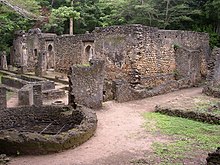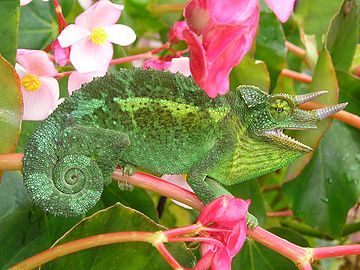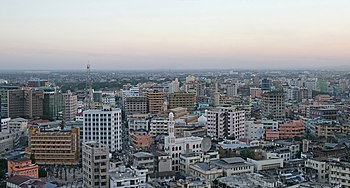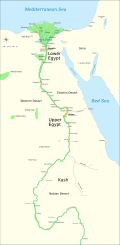Portal:Africa



Africa is the world's second-largest and second-most populous continent after Asia. At about 30.3 million km2 (11.7 million square miles) including adjacent islands, it covers 20% of Earth's land area and 6% of its total surface area. With nearly 1.4 billion people as of 2021, it accounts for about 18% of the world's human population. Africa's population is the youngest among all the continents; the median age in 2012 was 19.7, when the worldwide median age was 30.4. Based on 2024 projections, Africa's population will reach 3.8 billion people by 2099. Africa is the least wealthy inhabited continent per capita and second-least wealthy by total wealth, ahead of Oceania. Scholars have attributed this to different factors including geography, climate, corruption, colonialism, the Cold War, and neocolonialism. Despite this low concentration of wealth, recent economic expansion and a large and young population make Africa an important economic market in the broader global context. Africa has a large quantity of natural resources and food resources, including diamonds, sugar, salt, gold, iron, cobalt, uranium, copper, bauxite, silver, petroleum, natural gas, cocoa beans, and.
Africa straddles the equator and the prime meridian. It is the only continent to stretch from the northern temperate to the southern temperate zones. The majority of the continent and its countries are in the Northern Hemisphere, with a substantial portion and a number of countries in the Southern Hemisphere. Most of the continent lies in the tropics, except for a large part of Western Sahara, Algeria, Libya and Egypt, the northern tip of Mauritania, and the entire territories of Morocco, Ceuta, Melilla, and Tunisia, which in turn are located above the tropic of Cancer, in the northern temperate zone. In the other extreme of the continent, southern Namibia, southern Botswana, great parts of South Africa, the entire territories of Lesotho and Eswatini and the southern tips of Mozambique and Madagascar are located below the tropic of Capricorn, in the southern temperate zone.
Africa is highly biodiverse; it is the continent with the largest number of megafauna species, as it was least affected by the extinction of the Pleistocene megafauna. However, Africa also is heavily affected by a wide range of environmental issues, including desertification, deforestation, water scarcity, and pollution. These entrenched environmental concerns are expected to worsen as climate change impacts Africa. The UN Intergovernmental Panel on Climate Change has identified Africa as the continent most vulnerable to climate change.
The history of Africa is long, complex, and varied, and has often been under-appreciated by the global historical community. In African societies the oral word is revered, and they have generally recorded their history via oral tradition, which has led anthropologists to term them oral civilisations, contrasted with literate civilisations which pride the written word. During the colonial period, oral sources were deprecated by European historians, which gave them the impression Africa had no recorded history. African historiography became organized at the academic level in the mid-20th century, and saw a movement towards utilising oral sources in a multidisciplinary approach, culminating in the General History of Africa, edited by specialists from across the continent. (Full article...)
Selected article –
The ruins of Gedi are a UNESCO World Heritage site near the Indian Ocean coast of eastern Kenya. The site is adjacent to the town of Gedi (also known as Gede) in the Kilifi District and within the Arabuko-Sokoke Forest.
Gedi is one of many medieval Swahili coastal settlements that stretch from Barawa, Somalia to the Zambezi River in Mozambique. There are 116 known Swahili sites stretching from southern Somalia to Vumba Kuu at the Kenya-Tanzania border. Since the rediscovery of the Gedi ruins by colonialists in the 1920s, Gedi has been one of the most intensely excavated and studied of those sites, along with Shanga, Manda, Ungwana, Kilwa, and the Comoros. (Full article...)
Featured pictures –
Did you know (auto-generated) -

- ... that Olive MacLeod journeyed 6,000 km (3,700 mi) through Africa in 1910–1911 to visit her murdered fiancé's grave, and wrote a book based on her observations?
- ... that economist and anti-apartheid activist Vella Pillay arranged for South African revolutionaries to receive military training in the Soviet Union and China?
- ... that a 1939 thesis by Nathaniel Fadipe, The Sociology of the Yoruba, was the first sociological study by a black African?
- ... that South African singer Tyla delayed her debut album's submission date in order to collaborate with Tems?
- ... that Togo's abortion law was one of the first in Africa to allow abortion in the case of rape?
- ... that Freetown, Alabama, was founded by free and formerly enslaved African Americans in Alabama, whose church, built in 1929, burned down in 2022?
Categories
Selected biography –
Nnamdi Benjamin Azikiwe (16 November 1904 – 11 May 1996), commonly referred to as Zik of Africa, was a Nigerian politician, statesman, and revolutionary leader who served as the 3rd and first black governor-general of Nigeria from 1960 to 1963 and the first president of Nigeria during the First Nigerian Republic (1963–1966). He is widely regarded as the father of Nigerian nationalism as well as one of the major driving forces behind the country's independence in 1960.
Born in Zungeru in present-day Niger State to Igbo parents from Onitsha, Anambra State, Azikiwe learned to speak Hausa which was the main indigenous language of the Northern Region. He was later sent to live with his aunt and grandmother in his hometown Onitsha, where he learnt Igbo language. Living in Lagos State exposed him to learning the Yoruba language, and by the time he was in college, he had been exposed to different Nigerian cultures and spoke three languages. (Full article...)
Selected country –
 |
 |
|

| ||
Ethiopia (Ge'ez: ኢትዮጵያ ʾĪtyōṗṗyā), officially the Federal Democratic Republic of Ethiopia, is a country situated in the Horn of Africa that has been landlocked since the independence of Eritrea in 1993. Apart from Eritrea to the north, Ethiopia is bordered by Sudan to the west, Kenya to the south, Djibouti to the northeast, and Somalia to the east.
Ethiopia is one of the oldest nations in the world and Africa's second-most populous nation. It has yielded some of the oldest traces of humanity, making it an important area in the process of human evolution. Historically a relatively isolated mountain empire, Ethiopia has more recently become an active member of the international community. It became a member of the League of Nations in 1923, signed the Declaration by United Nations in 1942, was one of the fifty-one original members of the United Nations (UN), founded the UN headquarters in Africa, has more than 60 embassies around the world, and currently hosts the headquarters of the African Union (formerly the Organisation of African Unity), of which it was the principal founder. (Read more...)
Selected city –
Kisangani /kiːsəŋˈɡɑːni/ (formerly Stanleyville or Stanleystad) is the capital of Tshopo Province, located on the Congo River in the eastern part of the central Congo Basin in the Democratic Republic of the Congo. It is the country's fifth most populous urban area, with an estimated population of 1,602,144 as of 2018, and the largest of the cities in the tropical woodlands of the Congo.
Geographically, Kisangani is flanked by Banalia Territory to the north, Bafwasende to the east, Ubundu Territory to the south, and is bordered by both Opala and Isangi Territories to the west. The city spans an area of 1,910 square kilometers and is situated within the equatorial forest plain at coordinates 0°30' north latitude and 25°20' east longitude, just 80 kilometers from the equator. Kisangani is located approximately 2,100 kilometers (1,300 miles) from the mouth of the Congo River, making it the farthest navigable point upstream. (Full article...)
In the news
- 12 February 2024 –
- Two boats collide on the Congo River near Kinshasa, Democratic Republic of the Congo; with the death toll remains unclear. (AP)
- 11 February 2024 – 2023 Africa Cup of Nations
- In association football, hosts Ivory Coast win their third Africa Cup of Nations by defeating Nigeria 2–1 in the final. Sébastien Haller scores the winning goal in the 81st minute. (The Guardian)
- 10 February 2024 – Somali civil war
- Four Emirati soldiers and a Bahraini military officer are killed, while ten other people are injured, when a soldier opens fire at a military base in Mogadishu, Somalia, before being killed in the ensuing shootout. Al-Shabaab claims responsibility. (AP)
- 10 February 2024 –
- A Eurocopter EC130 helicopter crashes near Nipton, California, United States, killing all the six people on board, including Nigerian banker Herbert Wigwe. (CBS News)
- 10 February 2024 – 2023–2024 Senegalese protests
- Violent protests occur in Senegal following an announcement by President Macky Sall that presidential elections have been delayed from February 25 to December 15. (Sky News)
- 9 February 2024 –
- At least 18 people are killed during a collision between a bus and a truck on a road in Kinshasa, Democratic Republic of the Congo. (AP)
Updated: 16:33, 14 February 2024
General images -
Africa topics
More did you know –
- ...that Iyabo Obasanjo-Bello, a Nigerian Senator from the People's Democratic Party, is the daughter of former President Olusegun Obasanjo?
- ...that the 2007 South Africa miners' strike, which impacted over 240,000 workers, was the first ever industry-wide miners' strike in the history of South Africa?
- ...that Seleh Leha, a town in Tigray Region in northern Ethiopia, was the site of a leprosarium built during the Italian occupation of East Africa and abandoned in 1941?
- ...that Sarir field, an oil field in Cyrenaica operated by the Arabian Gulf Oil Company (AGOCO), is considered to be the largest in Libya, with estimated oil reserves of 12 Gbbl (1.9×109 m3)?
Related portals
Major Religions in Africa
North Africa
West Africa
Central Africa
East Africa
Southern Africa
Associated Wikimedia
The following Wikimedia Foundation sister projects provide more on this subject:
-
Commons
Free media repository -
Wikibooks
Free textbooks and manuals -
Wikidata
Free knowledge base -
Wikinews
Free-content news -
Wikiquote
Collection of quotations -
Wikisource
Free-content library -
Wikispecies
Directory of species -
Wikiversity
Free learning tools -
Wikivoyage
Free travel guide -
Wiktionary
Dictionary and thesaurus

























































































